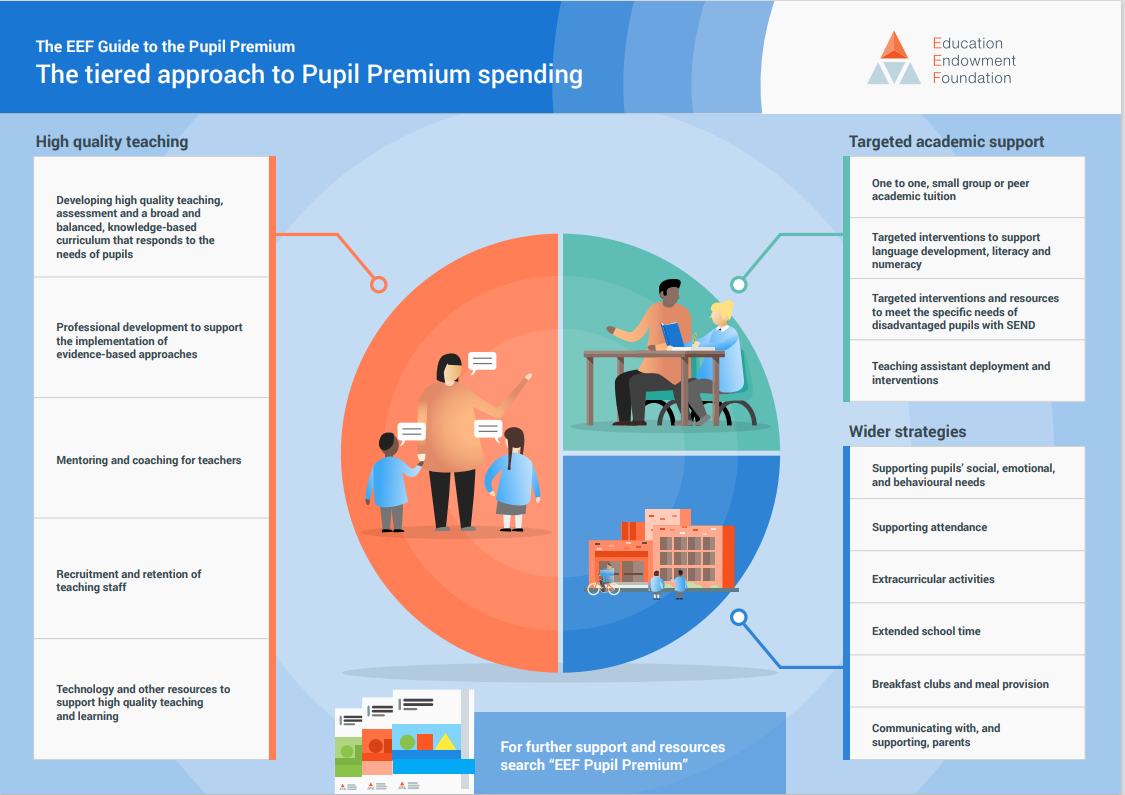Pupil Premium
PUPIL PREMIUM FUNDING
The Pupil Premium is funding that is allocated to schools for pupils from low income families who are known to be eligible for free school meals. Schools are able to use this funding as they see fit but are required to report on how the money was spent.
From 2011, the total funding available to schools was reduced. The allocation of additional funding in the form of the Pupil Premium Grant (PPG) provided an opportunity for schools to maintain certain aspects of their established provision.
Principles informing the use of the PPG:
- School provision should meet the needs of all learners
- A range of factors can be used to categorise pupils as being socially disadvantaged, including those that are eligible for free school meals (FSM) and some looked after children (LAC)
- Pupils eligible for free school meals sometimes can have other factors that can be a barrier to learning (e.g. special educational needs)
- The school will strive to ensure that vulnerable and disadvantaged pupils have their needs quickly identified and addressed
- The PPG will be allocated following a needs analysis which will identify priority classes, groups or individuals. Limited funding and resources mean that not all children receiving FSM’s will be in receipt of Pupil Premium interventions at any one time
National Context
The Pupil Premium is an allocation of funding, in addition to main school funding, which schools receive according to the number of children in specific groups.
Schools receive Pupil Premium funding for:
- children who have been eligible for free school meals (FSM) at any point in the last 6 years (commonly known as the ‘Ever 6’ rule)
- children who are looked after i.e. they are in Local Authority Care
- children adopted from care under the Adoption and Children Act 2002 and children who have left care under a Special Guardianship or Residence Order
- children recorded as an Ever 4 Service Child or in receipt of a child pension from the Ministry of Defence.
The government awards this funding to help raise achievement for these children. National data shows that as a group, children in these groups have consistently lower educational achievement than those who are not in these groups.
It is up to schools to decide how the Pupil Premium is spent, but this funding should be used to support these children. All schools are required to publish, on their websites, what funding they have received and how the money is being used.
Universal Free School Meals (a free school meal for all children up to Year 2, regardless of family income) was also introduced in September 2014 leading to widespread concerns that children who are entitled to Free School Meals (and therefore Pupil premium for the next 6 years) would no longer claim as the meals are free anyway.
School Context
We have used the government criteria set out in the bullet points above to identify who is in the Pupil Premium group. In addition to this we also identify pupils where:
- no claim for Free School meals has been made for that particular child due to the Universal Free School Meal provision
- children who meet the Pupil Premium criteria but we do not receive funding for in a current cycle as they joined the school after key census dates used to calculate the funding.
31% of pupils attending Franciscan Primary are currently included in the Pupil Premium group. This is higher than the national average for primary schools in England (around 26%) In general the proportion of pupils eligible for Pupil Premium increases as the year groups get older.
The aim of our use of Pupil Premium funding is to increase the attainment, progress and enjoyment of school life of all of these children, even if they are already performing above national expectations.
Pupil Premium approach:
Pupil Premium Action Plan - 2025 -2026
Pupil Premium Action Plan 2025 -2026
Pupil Premium funding aims:
- Raise the attainment and progress of pupils eligible for Pupil Premium funding so that they have better attainment and progress than the national average for Pupil Premium children
- They make consistently good or better progress
- They have better attainment and progress than the national average for all children
- There is no difference within school between the progress made by Pupil Premium children and their non –Pupil Premium peers
- Any gaps in attainment between Pupil Premium children and non-Pupil Premium children close over time
- Address any inequalities in education by raising attainment, accelerating progress and increase enjoyment in school activities





